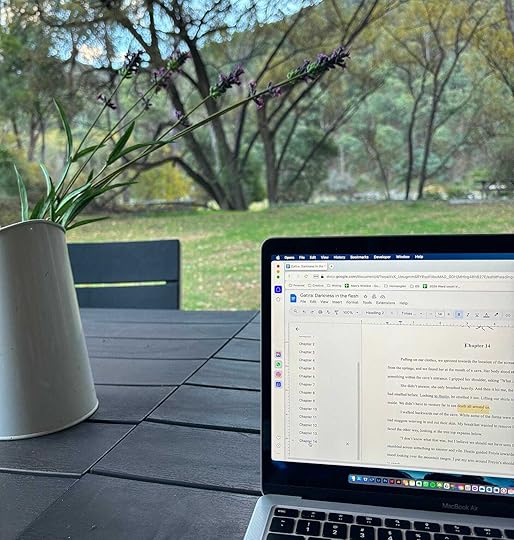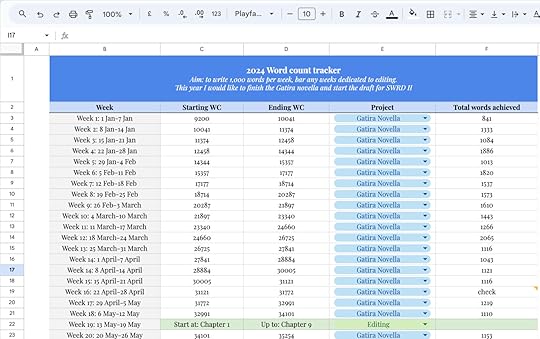How to create and maintain a writing routine
 My set up for some novel editing.
My set up for some novel editing.But, as you stare at the blank Word document, the thought of bringing your novel to life starts to become daunting.
You persist anyway, writing a chapter or two. But you are having doubts on whether you can continue it. Life gets in the way, and perhaps you think there's no point continuing the story.
Thanks for reading MG Hunt’s Author Life! Subscribe for free to receive new posts and support my work.
If you can relate to the above, you're not alone. This is how my brain worked when I wanted to start writing. I was determined to write, but I had little idea how to do it consistently. I wasn't sure how writing would slot into my already busy lifestyle.
But, through analysing my own work/life schedule, I found that a writing routine doesn't have to dominate my life. Instead, it should complement it.
You may have read the wildly popular self-help book, Atomic Habits by James Clear. Clear talks about the power of making tiny improvements every day, to transform into something over time:
"If you can get 1 percent better each day for one year, you'll end up thirty-seven times better by the time you're done."
I for one resonate with this way of thinking. Committing to a 1% improvement rate is something I am willing to engage with.
My mindset as always been if I can do just a little bit today, that little bit is better than nothing. And that is how I largely approach writing and my life in general.
Creating and maintaining a writing routine is important as the content I'm creating for a story.
You may have also heard the saying/joke:
"How do you eat an elephant?"
"One bite at a time,"
If you were faced with an elephant on your plate, you may be paralysed with fear. It's an elephant after all!
But there is only one way through, and that is to take one tiny bite at a time. And, eventually, the elephant is consumed.
So, let's tackle this novel one bite at a time.
1. Set yourself a daily or weekly goalChoose a timely word count or chapter goal, and stick to it.
Easier said than done, you might say. Well, I never said how much that word count/chapter goal has to be. It could be 100 words a day, 1000 words a week, or even 5 words a day!
Whatever you choose, decide on a goal that is 100% achievable for your lifestyle. Something that is non-negotiable, no matter the things life throws at you.
For me, my goal is a weekly word count of 1000 words. I have heard of authors writing much more than this a week, however I have to consider my lifestyle. I work a full time graphic design job, and have midweek after work commitments. So, my goal needs to be appropriate for my weekly routine.
If you are struggling to meet your daily/weekly goal, that is OK! That is important to realise, and this may prompt you to revisit your goals.
If you set yourself a goal of 100 words a day, and were struggling to meet that goal, drop that down to 50. Work out what is best for your personal life and commitments.
Life gets in the way. What is important is to focus on consistency. If you consistently show up, do the goal you have set yourself, you are at the end of the day making progress.
2. Know your preferred writing environmentWhen you picture yourself writing, what does that look like? What time of time of day, location, beverage is in your vicinity, perhaps?
For me, mornings are my preferred time to write. It is the caffein running through my veins as I sit in my bed, tapping away on my laptop, where I feel most productive. In general, I am always most motivated in the morning. Particularly on the two days I work from home, I try to maximise the time I have in the morning that would otherwise be spent on commuting.
Similar for weekends. With a cup of coffee in bed, I am motivated to pump words out first thing in the morning.
But you may feel that your prime writing time is after you've put the kids to bed, and can spend fifteen minutes or so in front of the laptop with a glass of wine. Or, maybe on your daily commute on public transport, you type away on your laptop or smartphone. Whatever it is, so long as you commit to some sort of progress each week.
Also, get to know your drink of choice while writing. I always look forward to my coffee when writing, but a lemongrass tea or glass of Sauvignon blanc after dinner doesn't go astray. I give you permission to treat yourself when you write. Make it an enjoyable and relaxing experience.
Think about what ideal environment you would like to write in. For me, I go between my bed or the lounge room couch. If I'm out in the lounge room, I put on my spotify playlist or relaxing youtube music video, put on my scent diffuser and type away. You should set the mood, so to speak. So, put on that candle, grab some snacks and get to typing.
 Writing on a holiday in Harrietville, Victoria, Australia.3. Record your progress
Writing on a holiday in Harrietville, Victoria, Australia.3. Record your progressRecording my word count is one way I track progress, but also see how far I have come.
Word count trackerTo help track my progress, I log my word count each day I write. I then tally how many words I write, on which project, for the week. I record my progress in a Google Sheet, and below is a snapshot of my template:
 My word count tracker, made on Google Sheets.
My word count tracker, made on Google Sheets.There is no one way on how to create a word count tracker. It will change depending on what you want to track, and what goals you have.
For me, my word count tracker includes the following:
Weekly word count
A selection of projects I'm working on
Goal of 1,000 words per week.
As you can see, my word count tracker is tailored to suit my goals. I also record the progress I make each week, and what project I am working on.
When I finish this project, 'Gatira Novella,' it will be pretty cool to see the progress I've made, and where I started. I continuously remind myself that creating and writing is not a race, and any progress is better than none.
Go for it.In this face-paced world we live in, it can be hard to not only make time to write, but to find the energy to do so. My advice to myself, and to anyone, is always to be kind to yourself. Enjoy the process of creation more than the output itself. You want your final product to be a labour of love, and a pleasure to engage with throughout the entire journey.
So, open up that blank document and write a few words.
I want to you know your thoughts about my tips. Do you have a writing project swimming around in your brain that you want to get out on paper? Or, do you have other tips that help you maintain your writing routine? I would love to know, so feel free to leave a comment or send me a message!
Thanks for reading MG Hunt’s Author Life! Subscribe for free to receive new posts and support my work.



